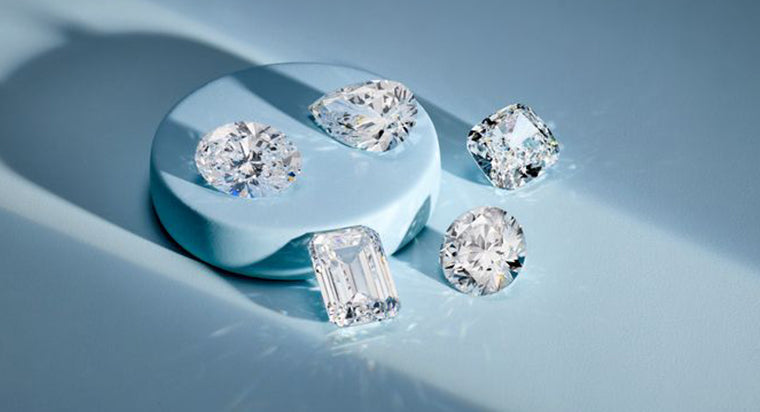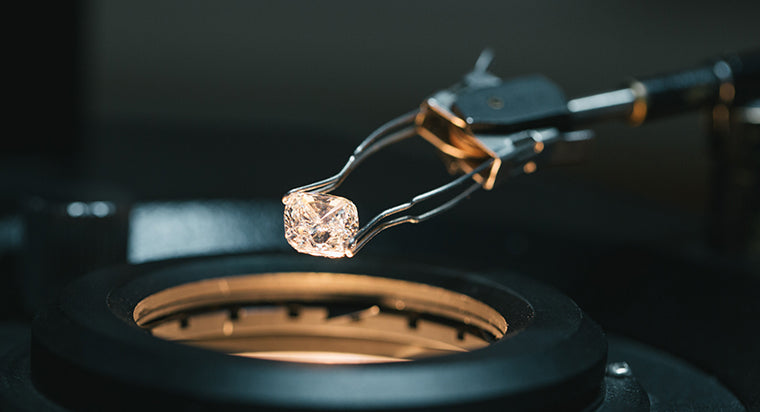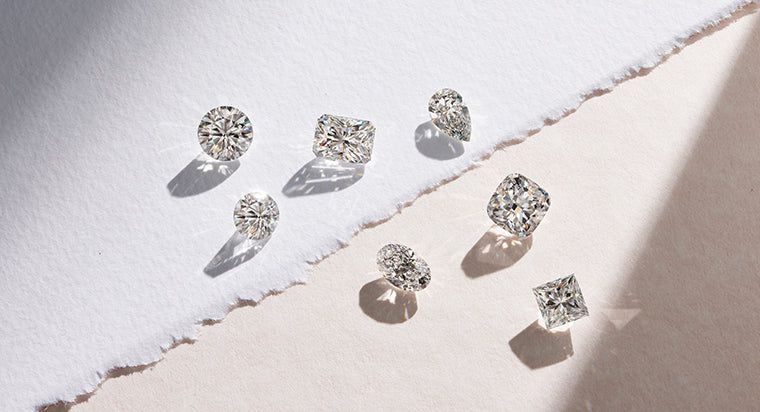Everything You Need to Know About Princess Cut Diamonds

Princess cut diamonds really are royalty in the diamond world. Princess diamonds, which are one of the square cut diamonds, are the second most popular shape behind round diamonds. And, like the stones that rank slightly above them, princess cut stones are brilliant cut. Princess cuts have a square (sometimes rectangular) shape with pointed corners and up to 76 small facets. On a GIA report, you'll see it called a square modified brilliant. But while these stones, which originated in the United States, have a gorgeous sparkle and daring corners, there's a lot more to love about these square shaped diamonds -- like the fact that their faceting reduces the visibility of flaws, or inclusions, in the diamond. To learn more about princess cut history, origin and popularity.
The princess cut diamond accounts for a whopping 30% of engagement rings, and shows no sign of letting go of its rank as the second most popular diamond choice. Maybe that's because princess cut diamonds have such a classic look. When turned upside down they resemble pyramids, and their four sharp corners offer a subtle edge to the femininity of their sparkle. Whatever it is, it's made this cut a popular choice for far more than princess cut diamond engagement rings. You can find the stunning stones on everything from necklaces to earrings, bracelets to ring-hand rings.
TABLE OF CONTENTS
When the Princess Cut Started and How it Got its Name
How long has this gorgeous cut been around? Well, there's some confusion there. Many believe the history of the princess cut dates back to the 1970s when a new shape, the Barion Cut, was introduced by Basil Watermeyer. This particular cut was actually more a combination of the emerald cut and the marquise cut. Princess diamonds actually date back to 1961 when a diamond cutter who was based in London, Arpad Nagy, created what was known then as a profile cut. That same cut is now known as the princess cut. After a few years, Betzalel Ambar, Ygal Perlman, and Israel Itzkowitz popularized the new name, which is why we all known them now as “princess cut".
Princess Diamond Popularity
Sure, we can tell you that the princess diamond is the second most purchased stone shape. (It is.) And that it even beats out its curvier cousin, the cushion cut. (It does.) But you probably don't need these stats. The bold lines and understated drama of the princess cut probably speaks for itself. Many brides-to-be love that this stone shape combines the femininity of diamonds (all that sparkle and flash) with an architectural edge thanks to those sharp corners. They're definite attention grabbers. And if seeing the stone wasn't enough to convince you, maybe this stone's fan club will. Here are just some of the celebrity engagement rings featuring princess cut diamonds:
- Emily Ratajkowski couldn't decide, apparently, because her unique engagement ring features a princess cut and pear shaped diamond on a gold band
- Cameron Diaz shows off her princess diamond solitaire engagement ring that's bezel set with a wide gold band free of accent diamonds
- Jaime Pressly's stunner is a 3 stone princess cut diamond ring with diamond halos around each of the brilliant stones
- Carrie Ann Inaba said yes to her now-ex on live TV when he proposed with a 2.5-carat princess cut solitaire featuring a D color stone
- Sherri Shepherd must love this diamond shape since her ring appears to not only have the princess at the center but also a channel set princess cut band
- Kendra Wilkinson accepted a princess diamond engagement ring from NFL player Hank Baskett that features three bands and split shank design
- Snooki of Jersey Shore fame said yes to a sizeable princess cut solitaire engagement ring set in a pave band featuring large stones
- Star Jones' ring from Al Reynolds, who she divorced in 2008, was a 7-carat princess cut stunner set with baguette stones on either side
Princess Cut Diamond Pricing
Princess cut diamonds are very efficient diamonds for manufacturers, but what does that mean for you? They use a very large percentage of the rough diamond (approximately 60% - 70%), so very little of the precious rough material is wasted. Wasted material drives up the cost, so expect to pay less for a princess cut diamond than a round brilliant of the same carat weight. But keep in mind, this is a very popular cut. For that reason, you're going to see higher prices with the princess diamonds than with other fancy shaped diamonds, such as the radiant cut or pear shaped diamond.
But, as with all diamonds, the price of your particular princess is going to come to down to how it's evaluated according to the 4 Cs of diamonds. Cut is especially important as it impacts the brilliance, or sparkle, of your stone. A less well cut diamond will appear more dull, while excellent cut diamonds should retain their dazzling beauty. For that reason, you should look for a stone with an excellent cut, polish, and symmetry. Choosing a princess diamond with these characteristics can be pricey, but we have expert gemologists on staff to help you figure out how to maximize your budget and get the best stone possible. They'll help you perform an in-depth diamond search to make sure you're getting a stone that will turn heads without breaking the bank. You will have to decide something based on personal taste, though: the length to width ratio. This determines whether your princess will be a square diamond or rectangular. (More on this later.)
Keep in mind, though, that princess cuts carry more of their weight in their center or belly. That means they're deeper stones than round brilliants and will look smaller at the same carat weight. That's because their weight, instead of spreading to their sides like the round, spreads downward. If the size of your stone is a priority, simply tell your gemologist. They can keep this in mind while hunting for your perfect diamond.
Princess Diamond Guide: Understanding Depth and Length to Width Ratio
Princess cuts can be either square or rectangular. The ideal ratio, from length to width, of a square princess cut is 1.00 to 1.04. The ideal ratio of a rectangular princess cut is 1.07 to 1.15. Below are the proportion ranges for princess cut diamonds and their respective cut grades. When shopping at With Clarity, you'll just need to know what shape you prefer. An expert gemologist can help you with finding the right ratio as long as you know what look you're going for with your princess cut diamond ring.

Depth % for Princess Diamonds
Excellent: 75%-66%
Very Good: 78%-62%
Good: 81%-55%
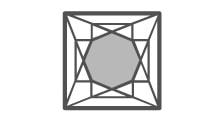
Table % of Princess Diamonds
Excellent: 75%-66%
Very Good: 77%-62%
Good: 82%-55%
Length to Width Ratio for Princess Diamonds
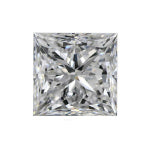
1.00
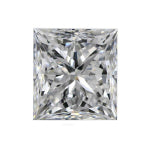
1.05
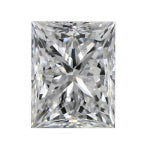
1.10
Princess Diamond Size Chart
Princess cut diamonds have approximate millimeter sizes that correspond to certain carat weights. You can use these to figure out what size stone you want in your princess cut engagement ring. Please see the chart below for the popular princess cut diamond sizes and their carat weights. For all sizes and shapes, please visit our diamond size chart page, where we have carat and mm measurements for every diamond shape.

Princess Cut Diamond Engagement Ring Styles
Although, as we mentioned, princess cut diamonds are popular for other jewelry, we think they really shine in engagement ring settings. The daring corners of this shape make the stone perfect for a princess cut solitaire, but there are many more options. People sometimes debate a princess cut vs round when they're shopping, and dislike how princess cut diamonds look smaller face-up. But we think there's an easy and elegant solution. Princess cut halo engagement rings are a gorgeous way to make your center stone look larger. And since princess diamonds cost between 25% and 40% less than their round-cut counterparts, it can also be a stylish way to save money.
Ways to Personalize Your Princess Cut Diamond Ring
That's probably why you'll see a lot of princess cut halo diamond engagement rings once you start looking. If you're going for something a little more unique, don't worry. This diamond shape is versatile. It's just as gorgeous taking center stage in a princess cut split shank engagement ring as it is in a square engagement ring with a halo. (Not all halos look the same, by the way.) And metals can make a big difference on your ring. A princess cut platinum engagement ring or a princess cut white gold diamond ring is a classic choice, but you can play up the romance by choosing a princess cut ring, or lend your look a vintage vibe by opting for a princess cut yellow gold engagement ring. And that's before you even consider style elements like milgrain and filigree.
So even if you love the classic style of this cut, don't feel boxed in by choosing a princess cut loose diamond. You can easily turn it into an engagement ring as stunning and unique as you are (or as the special someone you're shopping for).
FAQs
Which is the most popular shape of diamond?
The round cut diamond is the most popular shape, followed by the princess cut diamond.
Is the princess cut timeless?
Yes, the princess cut is considered a timeless and unique shape. It is the second most popular non-round diamond in the market, and its 58 facets offer splendid brilliance and piercing angles.
What affects the pricing of a princess cut diamond?
The pricing of a princess cut diamond will come down to the 4 C's of a diamond, namely cut, color, carat, and clarity. The cut is significant as it impacts your stone's brilliance. A less well-cut diamond will appear dull, while excellent-cut diamonds will retain dazzling beauty. For that reason, we recommend working with a gemologist to find a stone that offers the best of cut, polish, and symmetry.
What is the ideal ratio for a princess cut diamond?
A square princess cut's ideal ratio, from length to width, is 1.00 to 1.04. The ideal ratio of a rectangular princess cut is 1.07 to 1.15.
What does a princess cut diamond symbolize?
A princess cut diamond symbolizes romance and exudes unique and edgy appeal. It is the second most popular diamond cut (after round) and looks splendid when used on an engagement ring or when set in earrings and pendants.

